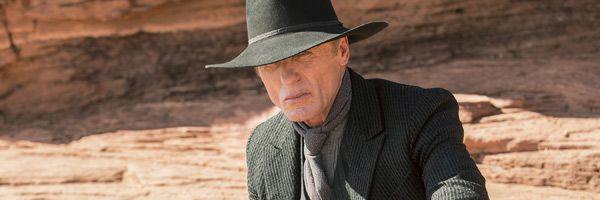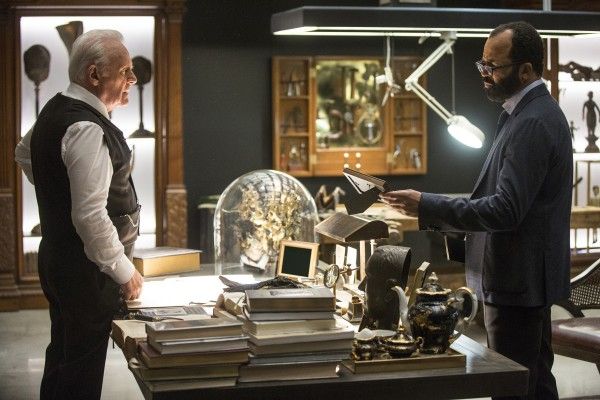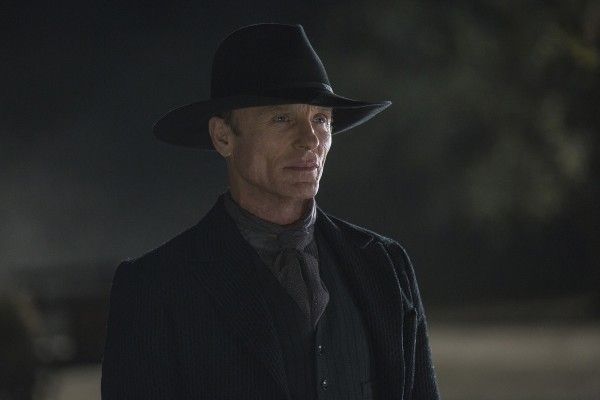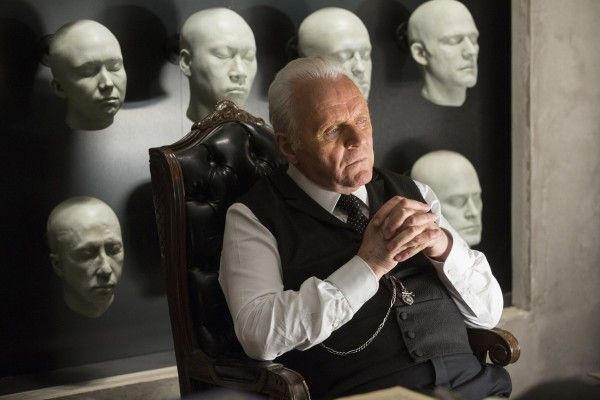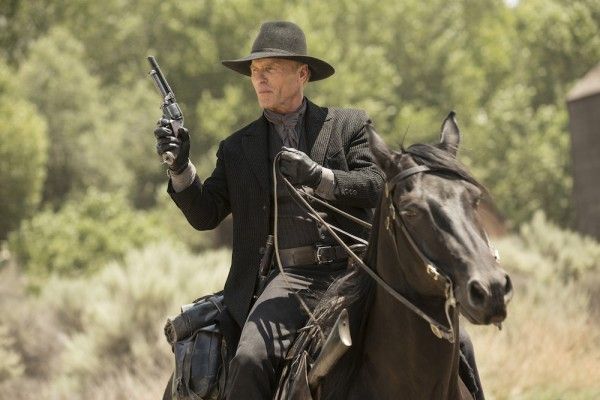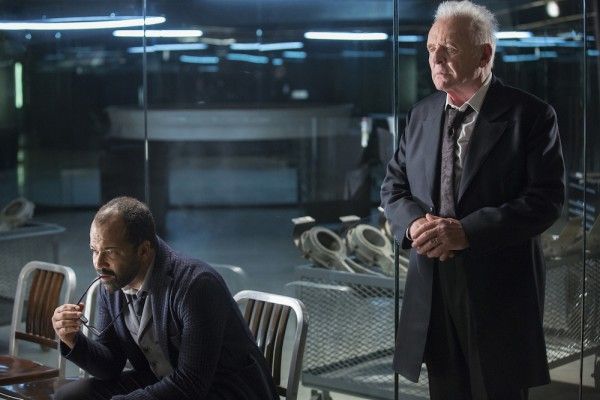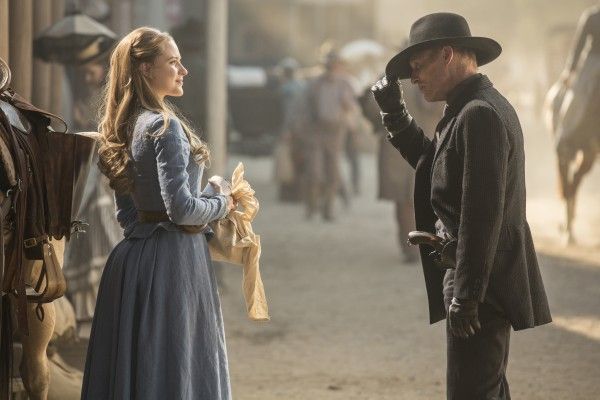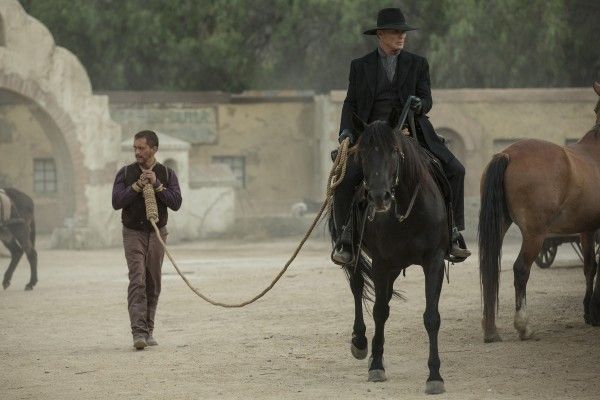Westworld has turned into one of the most thought-provoking pieces of science-fiction in recent memory, and that means the fan theory train has already left the station. With last Sunday’s premiere of Episode 3, followed by a teaser for Episode 4, more questions have been added to our long list, while the series creators continue to spark more debate. After yesterday’s head-scratching analysis of an intriguing fan theory, here’s another one to dissect amongst yourselves.
To give credit where credit’s due, this one actually stems from my roommate, Jessica Raad, after re-watching Episode 3, titled “The Stray.” The most poignant scene occurred between Dr. Ford (Anthony Hopkins) and head programmer Bernard Lowe (Jeffrey Wright), during which time the name Arnold was uttered.
As Ford explained, Arnold was the co-creator of Westworld who saw artificial intelligence as a pyramid that begins with memory, then improvisation, then self-interest. Arnold never reached what was at the top, but he based what he thought it was on “the bicameral mind,” a theory dissected in The Origins of Consciousness in the Breakdown of the Bicameral Mind by psychologist Julian Jaynes. It essentially postulates that early man believed consciousness to be the voice of the gods, which was eventually realized to be their own instincts kicking in.
Ford said Arnold died, but, against the backdrop of a mystery box approach, that could be any number of things. Was he, as some fans suggested, truly dead, secretly alive and roaming Westworld under the identity of the Man in Black, or even something more nefarious? Might he secretly be the one pulling the strings, leading the hosts, guests, and creators of Westworld into a shadowy unknown?
This new theory suggests that, yes, Arnold is alive and he is the Man in Black — but not in the sense that most people think.
Here’s what we know about Arnold: As Ford’s business partner, “he wasn’t interested in the appearance of intellect or wit — he wanted the real thing, he wanted to create consciousness.” The “only vestiges that remain” of his theory around “boot-strapping” consciousness are “the voice commands” the programmers use to control the A.I. With a personal life marked by tragedy, Arnold threw himself into his work and “his search for consciousness.” He became close to the hosts and “saw something in them. He saw something that wasn’t there.” The circumstances surrounding his death are unclear, but Ford said, “We called it an accident but I knew Arnold and he was very, very careful.”
Here’s what we know about the Man in Black: He cryptically said he’s been coming to Westworld for the past 30 years, and he’s had tussles with a number of the hosts, including Dolores (Evan Rachel Wood) and Teddy (James Marsden). He’s also looking for the center of a mysterious maze that we don’t know very much about. Though, a teaser for Episode 4 sees Bernard telling Dolores she may truly be “free” if she reaches the center of it.
What if Arnold and the Man in Black are in fact the same person? What if Ford was also telling the truth? Ford’s comment about Arnold being careful seems to imply his death wasn’t accidental, so what other reason might he have — other than suicide — to take his own life? What if Arnold died, but found a way to upload his consciousness into an A.I. body (i.e. the Man in Black)?
For one, the Man in Black doesn’t seem to be human. Yes, he can’t be harmed by the other hosts’ gunfire. But, as we saw with William (Jimmi Simpson), guests feel a physical impact when hit by a host’s pistol. The Man in Black doesn’t feel anything — he never displays any sort of reaction to being shot. Furthermore, he’s obsessed with a search of some kind. Maybe that, too, is the same as Ford: a search for true consciousness. What if what Bernard is telling Dolores about the center of the maze is actually freedom from programming, freedom from an A.I.’s servitude to its makers? That would give both Arnold and the Man in Black the same destination, but what is that destination, really?
Let’s assume that the center of this maze is an A.I.’s freedom from programming restraints, to be its own person, per se. Mentally, that would make an A.I. a person, only a person who can’t age, can’t be harmed, can’t be killed. It would make them immortal, and perhaps that’s exactly what Arnold has been searching for all these years. If he did upload his consciousness, he’d go from a person to an A.I. body held back by certain programming. The maze would, perhaps, rid him of that.
Since he became so obsessed with the hosts, maybe that’s what he wants for his children, too. How might he do that? The voice commands. As Ford said, those are the last remains of Arnold’s work on A.I. consciousness. There’s certainly one command that’s been causing more hosts to awaken: “These violent delights have violent ends.” The first to utter that phrase was Dolores’ father, who started malfunctioning after his interaction with the Man in Black. He then told it to his daughter, who passed it along to Maeve (Thandie Newton). Another early malfunction came with Walter (Timothy Lee DePriest) with his crazy milk stunt. He, too, was present with the Man in Black when he attacked Dolores’ home in Episode 1. Perhaps the Man in Black, then, was the one who started spreading the voice command.
There are a few possible holes in this theory, one of which is a statement from co-showrunner Jonathan Nolan, who said “I think that’s unlikely” when asked by EW if we’d ever see Arnold in any form. Another could be the other fan theory we dissected yesterday that suggests a different reasoning behind the effects of Westworld gunfire.
Regardless, it’s something fun to think about. What say you, internet?

